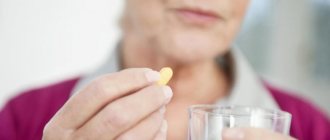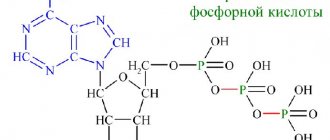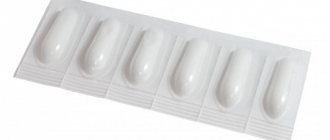Doxycycline is a semisynthetic broad-spectrum tetracycline antibiotic. Instructions for use explain how to properly take 100 mg capsules, injections in injection ampoules (lyophilisate) for the treatment of syphilis, ureaplasma and other infections. What Doxycycline helps with, information on prices, analogues and patient reviews will also be presented in the article.
Release form and composition
Doxycycline is available in the form of capsules and lyophilisate, which is used to prepare a solution for infusion.
- Gelatin capsules are hard, cylindrical and yellow in color. Inside the capsules there is a yellowish powder with white inclusions. There are 5 capsules in a contour package, and two such packages in a cardboard box.
- The lyophilisate is contained in 100 mg ampoules; there can be 5 or 10 ampoules in a cardboard box with partitions.
- Doxycycline dispersible tablets - 100 mg, 10 pieces in a package.
The drug capsules contain the active ingredient doxycycline (a substance in the form of doxycycline hyclate), as well as additional components: lactose monohydrate, magnesium stearate, potato starch.
Doxycycline ampoules (lyophilisate used to prepare a solution for infusion) contain the active component doxycycline (in the form of hydrochloride).
Compatibility with other drugs
Vitamin preparations that contain calcium bind doxycycline in the form of salts, which leads to a sharp decrease in its absorption in the intestine. Therefore, during therapy you should stop taking them. A similar effect is exhibited by medicinal products containing iron and sodium bicarbonate. A number of antacids, which are used for peptic ulcers and gastritis, block the absorption of this antibacterial drug. Taking laxatives, activated carbon and its analogues, as well as cholestyramine accelerates the elimination of doxycycline from the lumen of the digestive tract.
A separate aspect is the effect of the drug on the action of hormonal oral contraceptives. Doxycycline has been proven to reduce their effectiveness and increase the risk of bleeding. Therefore, patients who take oral contraceptives are advised to avoid sexual contact during therapy.
It is prohibited to combine tetracyclines with bactericidal antibiotics (penicillins, cephalosporins, fluoroquinolones, carbepenes). This is due to the fact that the effectiveness of the latter drops sharply when taken simultaneously and the risk of developing bacterial resistance to therapeutic agents increases.
Drugs (barbiturates, phenytoin, carbamazepine, rifampicin) that activate monooxygenases in the liver and the course of enzymatic reactions lead to a decrease in the effectiveness of doxycycline. Like other tetracyclines, this drug potentiates the effect of indirect anticoagulants (warfarin, dicoumarin, tromexane), which is important to consider in case of cardiovascular pathology and after surgical interventions.
Pharmacological characteristics
Doxycycline is a semisynthetic antibiotic belonging to the pharmacological group - tetracyclines, with a wide spectrum of action. Has a bacteriostatic effect.
Active against gram-positive microorganisms: aerobic and anaerobic bacteria. It is also active against gram-negative microorganisms: aerobic cocci and bacteria.
Pseudomonas aeruginosa, Proteus spp., Serratia spp., and most strains of Bacteroides fragilis are resistant to the drug. Helps with infectious diseases: sore throat, cystitis, gonorrhea and others. Effectively treats itching and complications after a tick bite.
Alternative Treatment
The use of antibiotics is a radical measure that has side effects. First you need to try to get rid of acne in less aggressive ways:
- Be more careful about your facial hygiene. Wash your face twice a day, cleansing the epidermis of dust and dirt.
- Follow a diet. Eliminate or limit fatty foods, sausages, baked goods and sweets in your diet. Stew or steam, forget about frying.
- Rule out allergies as the cause of rashes, because then you will need antihistamines, and not a course of Doxycycline for acne.
- Use high-quality decorative products (foundation, powder) and do not forget to remove makeup at night.
- Try external treatment with antibacterial ointments (“Clotrimazole”, “Zinerit”), which are applied pointwise to the site of inflammation.
- Ethnoscience. Wipe your face with calendula, make clay masks, apply aloe juice locally, etc.
If these measures do not help, then the dermatologist uses the acne antibiotic Doxycycline.
Why is Doxycycline prescribed?
The drug helps in the following cases:
- Inflammatory and infectious diseases of the respiratory system - bronchitis (acute and chronic), pneumonia, bronchopneumonia, tracheitis, laryngitis, pulmonary empyema, lung abscess;
- Infectious processes of the nasal and oropharyngeal organs - pharyngitis, otitis media, tonsillitis, sinusitis, sinusitis, tonsillitis;
- Inflammatory diseases of the genitourinary system of infectious origin - pyelonephritis, cystitis, urethritis, gonorrhea, orchitis, epididymitis, urogenital mycoplasmosis, cervicitis, endocervicitis;
- Exacerbation of chronic cholecystitis;
- Cholangitis;
- Dysentery;
- Gastroenterocolitis;
- Infectious lesions of soft tissues - boils, carbuncles, abscesses, phlegmon, panaritium, secondary bacterial infection in burns and wounds;
- Syphilis, proctitis, prostatitis, chlamydia.
Doxycycline is also prescribed for preventive purposes after surgery or when traveling to countries where it is easy to become infected with listeriosis, dysentery, and cholera.
Indications for use
According to the instructions, Doxycycline is indicated for use in the following cases:
- Infections of the ENT organs (sinusitis, otitis media, tonsillitis);
- Infections of the upper and lower respiratory tract (acute bronchitis, tracheitis, pleural empyema, bronchopneumonia, lung abscess, pneumonia);
- Infections of the biliary tract and gastrointestinal tract (gastroenterocolitis, cholecystitis, cholangitis);
- Infections of the genitourinary system (pyelonephritis, cystitis, endometritis, urethrocystitis, endocervicitis, gonorrhea);
- Infectious eye diseases;
- Infections of the skin and soft tissues (furunculosis, cellulitis, wounds, infected burns, abscess);
- Syphilis, malaria, cholera, amoebic and bacillary dysentery, Lyme disease, typhus, Rocky Mountain spotted fever, rickettsiosis, yersiniosis, chlamydia, yaws.
As part of a combination treatment, Doxycycline is prescribed for trachoma, leptospirosis, ornithosis, psittacosis, sepsis, whooping cough, osteomyelitis, and subacute septic endocarditis.
For the purpose of prevention, the use of Doxycycline is advisable to prevent malaria during short trips, as well as in the postoperative period to prevent purulent complications.
Medical instructions for use
Doxycycline is taken orally during or after meals with a glass of water. According to the instructions for use of Doxycycline, in adults and children over 12 years of age weighing more than 45 kg, the average daily dose is 200 mg on the first day (divided into 2 doses - 100 mg 2 times a day), then 100 mg / day.
- “Travelers’ diarrhea” (prevention) – 200 mg on the first day of the trip (in 1 dose or 100 mg 2 times a day), 100 mg 1 time a day during the entire stay in the region (no more than 3 weeks).
- For gonorrhea, 100 mg is prescribed 2 times a day for 2-4 days. Men suffering from gonorrheal urethritis are treated with a single dose of Doxycycline 300 mg. If the pathogen is more resistant to the drug, then men need to take 200 mg for 4 days, and women - 200 mg for 5 days.
- Primary and secondary syphilis: the daily dosage of Doxycycline is 300 mg (divided into several doses). The course of treatment is at least 10 days.
- For chronic infections of the urinary system - 200 mg/day throughout the entire period of therapy.
- For uncomplicated infections of the urethra, cervix and rectum caused by Chlamydia trachomatis, 100 mg is prescribed 2 times a day for at least 7 days.
- Infections of the male genital organs - 100 mg 2 times a day for 4 weeks. Treatment of malaria resistant to chloroquine - 200 mg/day for 7 days (in combination with schizonticidal drugs - quinine); malaria prophylaxis - 100 mg 1 time per day 1-2 days before the trip, then daily during the trip and for 4 weeks after return;
- Prevention of infections after a medical abortion - 100 mg 1 hour before the abortion and 200 mg 30 minutes after.
- For the treatment and prevention of cholera, adults take 300 mg of Doxycycline orally once.
- For acne – 100 mg/day, course – 6-12 weeks.
Maximum daily doses for adults are up to 300 mg/day or up to 600 mg/day for 5 days for severe gonococcal infections.
Ampoules
Adults are prescribed intravenously (drip) 200 mg per day on the first day of treatment, in subsequent days - 100-200 mg per day. The frequency of administration (or intravenous infusion) is 1-2 times a day. For children over 8 years of age and weighing more than 50 kg, the daily dose for oral administration or intravenous administration (drip) is 4 mg/kg on the first day of treatment.
Read also: Why is Klacid prescribed? Instructions, reviews and analogues, prices in pharmacies
In the following days - 2-4 mg/kg per day, depending on the severity of the clinical course of the disease. The frequency of intravenous infusion is 1-2 times a day. The recommended minimum time for IV infusion of 100 mg doxycycline (at an infusion solution concentration of 0.5 mg/ml) is 1 hour.
The maximum dose for intravenous administration is 300 mg per day.
Use during pregnancy and lactation
Doxycycline penetrates the blood-placental barrier. Tetracyclines have a negative effect on the fetus (slow down osteogenesis) and on the formation of tooth enamel (cause hypoplasia, irreversibly change the color of tooth enamel). For this reason, and also due to the increased risk of liver damage in the mother, tetracycline drugs are not prescribed to pregnant women. The exception is when Doxycycline Solution Tablets is the only remedy for the treatment/prevention of particularly dangerous and severe infections (for example, inhalation exposure to Bacillus anthracis, Rocky Mountain spotted fever, etc.). Before prescribing doxycycline to women of childbearing age, pregnancy must first be excluded.
Doxycycline passes into breast milk. Because it, like other tetracyclines, has adverse effects, its use during breastfeeding is contraindicated. If there is an urgent need to prescribe tetracyclines to a nursing mother, breastfeeding should be stopped.
Side effects
During therapy with Doxycycline, patients often develop the following side effects:
- From the nervous system - paresthesia, headaches, dizziness, increased intracranial pressure, toxic brain damage;
- One hundred sides of the digestive canal - nausea, a feeling of heaviness in the right hypochondrium, vomiting, diarrhea, anorexia, liver enlargement, exacerbation of chronic diseases of the stomach and duodenum, dysphagia, glossitis, development of enterocolitis;
- Blurred vision, double vision, ringing in the ears;
- Tachycardia, changes in electrocardiogram parameters;
- Hemolytic anemia, thrombocytopenia, eosinophilia, decreased prothrombin index;
- Allergic reactions - urticaria, anaphylactic shock, skin rash, hyperemia, swelling of the mucous membranes of the respiratory tract;
- Changes in the color of tooth enamel;
- Vaginal candidiasis.
Doxycycline for acne: how to take
There are a huge number of products to combat acne and other skin imperfections. In some cases, Doxycycline, a systemic antibiotic, is used for this purpose. Doxycycline instructions for use for acne recommend using it only as prescribed by a doctor. It can be bought at almost any pharmacy without a prescription.
Composition and principle of action
Doxycycline is an antibiotic with a fairly wide spectrum of action. It inhibits the activity of bacteria living on the skin, including those that cause acne. The product is available in several dosage forms - capsules, lyophilisate in injection ampoules and tablets.
To combat acne, tablets or capsules are used. The use of injections is irrational.
Tablets and capsules are taken orally, and they are almost completely absorbed from the gastrointestinal tract. After two hours, a therapeutic concentration of doxycycline in the blood is achieved.
The active substance penetrates well through histohematic barriers, including the placental one. The exception is cerebrospinal fluid, in which the doxycycline content remains minimal. It is excreted along with sweat, which allows us to prescribe Doxycycline for acne). It is excreted from the body through the intestines with bile.
The mechanism of action is associated with disruption of the synthesis of a number of bacterial cell proteins. Causative agents of intestinal infections, staphylococci, streptococci, and pathogens of sexually transmitted infections are sensitive to it. It is considered one of the safest drugs in its group (tetracyclines).
Why Doxycycline for Acne?
Doxycycline is not the primary treatment for acne. However, it is excreted in sweat and is highly soluble in sebum, so it can affect the skin microflora. One of the reasons for the appearance of acne is the increased activity of staphylococcus on the skin, and this microorganism is sensitive to Doxycycline.
The use of the drug is justified if:
- the bacterial nature of acne has been established;
- the sensitivity of bacteria to Doxycycline has been established;
- pimples are multiple and have an advanced nature;
- the drug is prescribed simultaneously with local agents.
The last condition is extremely important. Since there are several reasons for the appearance of acne, and among them, not only bacteria play a significant role, but also skin features that create favorable conditions for the proliferation of bacteria. Therefore, the most effective remedy against acne is to eliminate the environment favorable to bacteria, and the antibiotic only acts as support if the skin condition is too advanced.
When it comes to the question of which is better, capsules or tablets, we can safely say that there is not much difference. The dosage of the drug should be determined by the doctor, as well as its regimen. There are some folk recipes for external use of Doxycycline, but they should also be used under the supervision of a doctor.
You should not use an injection form for acne; giving injections is less convenient than taking pills, and they do not have a significant advantage in effectiveness.
How to take Doxycycline correctly
A doctor must prescribe a treatment regimen. He will also explain how to properly take Doxycycline for acne. The dosage for acne is usually 50 mg per day (half a tablet), but may be higher if a specialist deems it necessary. You can take the drug at any time of the day, but always after meals with plenty of water. The duration of treatment ranges from 6 to 12 weeks, sometimes more.
Local agents must be used together with the antibiotic. A dermatologist will help you choose the right skin care. Lotions are needed that contain a disinfecting component, deeply cleansing, but at the same time not disturbing the natural moisture of the skin. You can use moisturizing creams selected together with your doctor.
Local antiseptics, such as hydrogen peroxide or chlorhexidine, cannot be used - they dry the skin and cause increased activity of the sebaceous glands.
While taking the antibiotic Doxycycline for acne, it is necessary to wash your face only with special medicinal products that cleanse the skin without irritating it or disrupting the processes of sebum secretion. The use of soap for this purpose is not recommended - this can significantly delay the course of treatment. In addition, you should avoid exposure to open sun.
Doxycycline should not be combined with other tetracyclines and dairy products. Concomitant use with related drugs does not enhance effectiveness, but significantly increases the severity of side effects. Calcium contained in dairy products enters into a chemical reaction with the active ingredient of the drug, disrupts its absorption, and reduces the effectiveness of treatment.
External use
How to take doxycycline for acne externally will tell you the traditional method of treatment. There is no clear answer to the question whether this method of use is more effective than taking pills. In some patients it has a positive effect, in others it does not, but at the same time it causes strong adverse reactions.
At home, prepare mash with Dosicycline. The method of preparing the product is as follows:
The tablets must be crushed into powder, mixed with Dimexide solution, left for 24 hours and shaken periodically. Then you need to dilute the resulting mash with saline, shake again and treat the skin twice a day. After the procedure, you need to apply a nourishing cream.
Contraindications and side effects
You can use Doxycycline for acne only as prescribed by a doctor and under his supervision. This applies to both tablets and mash (the effectiveness of which doctors question). You must first inform a specialist about various chronic diseases so as not to harm your health.
The most common contraindication is an allergy to tetracyclines. The drug is prohibited for use in cases of liver and kidney failure and porphyria.
It is strictly forbidden to use a tetracycline drug during pregnancy, breastfeeding and in children under 8 years of age.
There are quite a few side effects of the antibiotic, and given that if the doctor prescribed Doxycycline for acne - the course of treatment lasts a long time, the patient will definitely encounter them.
With prolonged use, skin allergic reactions, digestive disorders occur, and hearing and vision may be impaired. The patient may begin to experience ringing in the ears, double vision, weakness, and fatigue. Possible inhibition of hematopoiesis, arrhythmia, decreased blood pressure.
The use of antibiotics during pregnancy is strictly contraindicated, since the drug has a powerful teratogenic effect - causing congenital deformities in the fetus. Its use in a nursing mother threatens severe digestive disorders in the baby, allergic disorders, and hematopoietic disorders.
In preschool children, the greatest danger is dysbacteriosis, against which clostridial or fungal colitis easily develops.
Doxycycline for acne is prescribed in small doses, so overdose is rare. Its symptoms are vomiting and diarrhea, abdominal pain, hearing loss. In this case, the patient needs to drink plenty of fluids; you can take activated charcoal or smecta. There is no need to fight vomiting and diarrhea; you should not take painkillers. If the patient's condition worsens, you need to call an ambulance.
Precautions and special instructions
To avoid dysbiosis, it is advisable to follow a healthy diet. Dairy products must be excluded. It is also worth forgetting about alcohol during treatment. Drug interactions are described in detail in the instructions - Doxycycline is incompatible with many drugs.
When using an antibiotic for acne, it is not advisable to engage in work that requires increased attention, as well as drive vehicles. Some side effects may affect patient safety. You should not take sick leave for the duration of treatment, but if the patient cannot change the type of activity for a while, it is worth thinking about another method of treatment.
Doxycycline does not help with acne, blackheads and other skin conditions. For this purpose, other means are used, primarily local application. The fact is that bacteria are not involved in the occurrence of these deficiencies, or their role is much lower than with profuse acne, so the antibiotic will not be effective. It makes sense to use the product only when there are a lot of acne on the face and local medications cannot cope with them. In this case, comprehensive treatment of the rash is necessary.
Using Doxycycline as the only remedy for acne is ineffective.
The full course of therapy should be selected by a dermatologist, taking into account the individual characteristics of the patient.
Reviews
Olga:
I took an antibiotic for a month and a half, the rash did not completely go away, but it became noticeably smaller.
Vlada:
Doxycycline didn’t help me, my acne just got a lot more. Plus, dysbacteriosis has developed. I had to take probiotics for another month.
Marina:
I used doxycycline and developed a terrible allergy. I had to stop using it any further.
Overdose
Symptoms of overdose, especially in patients with functional liver disorders - possible neurotoxic reactions (convulsions, nausea, vomiting, dizziness, disturbances of consciousness as a result of increased intracranial pressure).
Treatment consists of discontinuing the drug, gastric lavage with activated charcoal, and symptomatic therapy. Antacids and magnesium sulfate are prescribed to prevent absorption of doxycycline.
There is no specific antidote. Hemodialysis and peritoneal dialysis are ineffective.
Negative consequences of self-medication
The affordability of the drug sometimes has the opposite effect. The girl heard from a friend that Doxycycline will help with acne, and heads to the pharmacy. Such random healing can have negative consequences, because antibacterial agents have a devastating effect on the body, for example:
- the load on the liver increases, and the organ ceases to cope with toxins and poisons, which further provokes the appearance of acne;
- immunity decreases;
- Sometimes an allergy manifests itself in the form of peeling or itching of the skin.
In addition, acne may never go away. This suggests that the formation of rashes is not caused by a staphylococcal infection, but by other bacteria that are not sensitive to tetracycline. Or the reason is something else - allergies, an imbalance in the thyroid gland, the use of low-quality cosmetics that clog the skin, etc. That is why only a doctor should prescribe Doxycycline therapy for acne.
Analogs
Complete analogues of the active substance:
- Bassado;
- Vibramycin;
- Vidoccin;
- Dovitsin;
- Doxal;
- Doxibene;
- Doxibene M;
- Doxilan;
- Doxycycline Nycomed;
- Doxycycline Stad;
- Doxycycline-AKOS;
- Doxycycline-Ferein;
- Doxycycline hydrochloride;
- Xedocin;
- Monocline;
- Unidox Solutab.
When choosing analogues, you must remember that the instructions for use of Doxycycline, price and reviews do not apply to drugs of similar effect. Replacing the drug is permissible only after the recommendation of a doctor.
Dosage
Considering the different areas of application, an antimicrobial, anti-inflammatory agent is used individually; how to take it is decided only by a consulting specialist. Based on the purpose of the drug Doxycycline and indications for use, the doctor may recommend the following course of treatment:
- preventive purposes: starting from 200 mg daily intake on a descending basis, reduced to 100 mg;
- severe infectious pathologies: 200 mg per day;
- inflammatory processes in women: 100 mg – 200 mg per day;
- male diseases: single dose of 200 mg - 300 mg;
- from eight years: from 4 mg per kilogram of weight, in descending order.
The general course of treatment with Doxycycline, given its composition, usually does not last longer than 15 days. Complex treatment is allowed, together with taking Clindamycin, Gentamicin. In case of rapid improvement, treatment should be stopped immediately.
Important!
It is dangerous to independently select the dosage and self-medicate using this group of antibiotics, especially when combined with other tablets. Doxycycline has a unique, strong composition; the dosage must be strictly individual.
special instructions
Since the drug has an irritating effect on the mucous membranes of the digestive tract, it is recommended to take the capsule with plenty of water or take the medicine shortly before meals.
- Since the patient’s likelihood of photosensitivity increases under the influence of the drug, exposure to direct sunlight should be limited during the course of therapy.
- If it is necessary to take capsules for more than 3 days, the patient is recommended to monitor the state of liver and kidney function and the clinical picture of the blood.
- During drug therapy, the patient's tooth enamel color may change, becoming gray or yellow.
- According to medical studies, the drug has an embryotoxic effect, therefore the use of Doxycycline during pregnancy is strictly contraindicated. If a woman took the drug and did not know that she was pregnant, she should definitely inform the gynecologist about this. As a rule, such a pregnancy has to be terminated artificially.
- During treatment with the drug, women may develop persistent vaginal candidiasis, so to avoid this, it is recommended to take yogurt or lacto and bifidobacteria preparations simultaneously with Doxycycline to maintain normal microflora of the genital tract.
Since during drug therapy the patient may experience drowsiness and lethargy, during the treatment period it is recommended to refrain from driving a car or operating complex mechanisms that require increased concentration.
Contraindications
The use of Doxycycline is not recommended in case of hypersensitivity to the components of the drug, in particular to doxycycline and tetracycline, as well as in case of liver or kidney failure, lupus erythematosus, porphyria, leukopenia and in children under three years of age.
The use of Doxycycline during pregnancy and lactation is possible only if treatment with other alternative, safer drugs is impossible or contraindicated.
Drug interactions
Cross-therapy with bactericidal drugs reduces the effect of their action, so simultaneous use should be avoided
Doxycycline affects the reliability of the use of contraceptives and also leads to an increase in the frequency of bleeding when taken simultaneously with estrogen-containing oral contraceptives
Cross-use of methoxyflurane can lead to acute renal failure and even death
After using Doxycycline along with retinol, increased intracranial pressure is observed.
Reviews of Doxycycline Solution Tablets
Patients leave positive reviews about Doxycycline Solution Tablets. The drug has proven itself as an effective remedy in the treatment of thrush, acne (including severe forms; used as part of combination therapy), and many other diseases of infectious etiology. Users consider its affordable cost to be another advantage of the drug.
Some patients do not like the taste of Doxycycline Solution Tablets and the impressive list of side effects. More often than others, disorders of the digestive system developed, and therefore antibiotic therapy is recommended to be accompanied by taking probiotics to relieve adverse events from the gastrointestinal tract.












